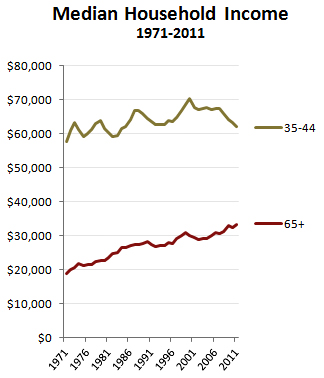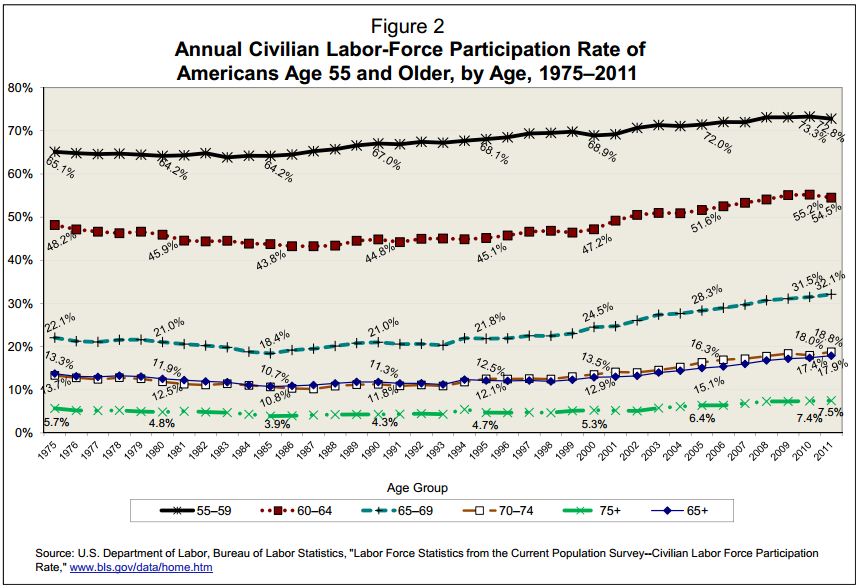Yesterday, Kevin Drum – a normally thoughtful blogger at Mother Jones – responded to a post by Jared Bernstein (former Chief Economist to V.P. Biden) about the sorry state of retirement savings in America. Bernstein wrote that the “not-very-healthful” status of private defined-plans retirement plans, coupled with the decline in employer-sponsored pensions, makes protecting Social Security an even higher priority.
 But Drum advocated for cuts, arguing that since seniors have a higher median income than they did 40 years ago, we should be willing to cut Social Security benefits (his graph at right). Drum writes:
But Drum advocated for cuts, arguing that since seniors have a higher median income than they did 40 years ago, we should be willing to cut Social Security benefits (his graph at right). Drum writes:
Despite the decline of DB pensions, the median income of retirees has grown 75 percent over the past four decades. The median income of middle-aged workers has grown a bit less than 8 percent.
It’s too bad he didn’t take a close look at those numbers. If he did, Drum would have seen that more older people are working past retirement age.
Since 1975, older workers have worked longer at every age cohort, as the chart below shows. From 1975 to 2011, there was a 45% increase in workforce participation among those age 65-69, a 37% for 70-74, and a 32% increase for those 75 and older.
So, it’s really pretty easy to see why income among seniors is increasing – some people are working longer, and thus have higher incomes. And it’s a trend that is likely to continue, as the BLS predicts nearly 23% of the 65+ crowd will still be working by 2020 (a 26% increase from 2011).
Now, some might argue this means we should raise the retirement age even further. But just because some seniors are working longer doesn’t mean everyone can. Less than 1 in 5 seniors is currently employed, and many are simply unable to work into their 60s due to health problems or infirmity.
Raising the retirement age because some people are working longer simply means Social Security would be less available to minorities, unskilled manual laborers, the less affluent, and other groups with shorter life expectancies. From a CBO report on disparities in life expectancy:
There is a growing disparity in life expectancy between individuals with high and low income and between those with more and less education.
In short, Kevin, you’ve got it all wrong. Cutting Social Security benefits – which average less than $15,000/year – is both bad politics and bad policy. Jared Bernstein is right. We should be trying to help Americans retire with a modicum of economic security – not taking away their Social Security. If we “scrap the cap“, we can ensure everyone pays the same tax rate for the same guarantee from Social Security.
More To Read
May 2, 2024
Baby Bonds: A Step Toward Racial and Economic Equity
The Washington Future Fund would bring this innovative, anti-racist policy to the Evergreen State
May 1, 2024
Laws Targeting LGBTQ Youth Aren’t Just Bad for Kids – They’re Bad For The Economy
The harm done by anti-LGBTQ laws expands so much further than queer children and teens
April 26, 2024
What is WA Cares and Why Does It Matter for Washingtonians?
We need to defend this important policy from billionaires looking to save a buck

